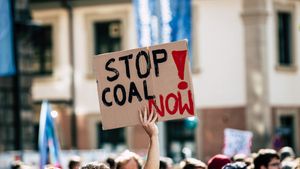Delegates celebrated a historic decision at the COP16 UN biodiversity summit held recently in Cali, Colombia, culminating in the agreement to establish an Indigenous subsidiary body aimed at amplifying the voices of Indigenous peoples within global discussions on biodiversity. This development highlights the growing recognition of the invaluable contributions of Indigenous knowledge systems to environmental conservation and biodiversity management.
During lengthy negotiations, which extended late Friday night, countries came together to finalize key aspects of the agenda at the summit. These included acknowledgments of the pivotal roles played by Indigenous peoples and people of African descent, particularly with reference to environmental stewardship and protection. The summit, which served as a follow-up to the landmark 2022 agreement made at Montreal, featured proposals for 23 measures intended to bolster the conservation of the Earth's diverse flora and fauna.
The co-chairs for the new subsidiary body, as outlined during the COP16 sessions, are set to include representatives from both UN parties and Indigenous communities, ensuring inclusive participation from diverse geographical regions. At least one co-chair will be nominated from developing countries, with gender representation taken seriously. During the discussions, Colombia’s Minister of Environment, Susana Muhamad, remarked on social media, "With this decision, the value of the traditional knowledge of Indigenous peoples, Afro-descendants, and local communities is recognized, and a 26-year-old historical debt is settled within the framework of the Convention on Biological Diversity."
The initiative to create this subsidiary body stems from acknowledgment of the 26 years since the Convention on Biological Diversity (CBD) was introduced, during which Indigenous perspectives have often been sidelined. Environmentalists and Indigenous leaders expressed their joy and relief at this newfound recognition, viewing it as both a victory and necessary step for the future of biodiversity discussions.
The agreement will facilitate relevant Indigenous voices and knowledge systems to be integrated more consistently within conversations at COP meetings and beyond, potentially altering how conservation efforts are aligned with Indigenous rights and traditional ecological practices. The decision also reflects the commitment to uphold international human rights standards as part of global biodiversity frameworks, reaffirming the communities' rights to manage lands traditionally held by them.
Indigenous delegates made it clear during the summit how important their input would be moving forward. Erupting with cheers and tears of joy, they articulated their hopes for meaningful action on conservation and biodiversity management, following years of persistent calls for recognition and action.
Beyond the recognition of Indigenous contributions, additional agreements made at COP16 focused on safeguarding human health from the threats posed by biodiversity loss. Environmental advocates stressed the need for immediate action against ecosystem degradation since environmental integrity directly impacts both human and animal health.
Despite these advances, delegates faced tough negotiations as they sought to bridge vast differences on key issues, including financial commitments required to fulfill the aspirations set forward during the summit. Although participants pledged approximately $400 million to support global biodiversity initiatives, it fell markedly short of the $20 billion annually pledged by wealthy nations during the 2022 Montreal summit for developing nations. This figure is expected to rise to $30 billion by 2030, prompting questions about how the most vulnerable countries will address pressing ecological challenges with such limited resources at their disposal.
According to the latest reports from the World Wildlife Fund and the Zoological Society of London, global wildlife populations have diminished alarmingly, averaging a 73% drop over the past 50 years. This stark reality casts shadows on the funds available and the global commitment to preserving biodiversity, as delegates grappled with the enormity of the task at hand.
The summit showcased Indigenous and local communities’ cultural presentations, reflecting rich traditions intertwined with nature, which served to remind attendees of the beauty and wisdom embedded within Indigenous cultures. Pledges made during the conference exhibited momentum, but the impending challenge lies in translating these promises to tangible outcomes. The task now is to hold countries accountable for these commitments, ensuring the new subsidiary body is not just symbolic but rather empowered to effect real change.
Ready for continued advocacy, Indigenous leaders left the summit with renewed energy, vowing to persistently assert their rightful place at the environmental decision-making table. The breath of hope and determination experienced at COP16 symbolizes more than just policy agreements—it stands as a living acknowledgment of the depth of Indigenous knowledge and the need for collaborative and inclusive environmental solutions.



